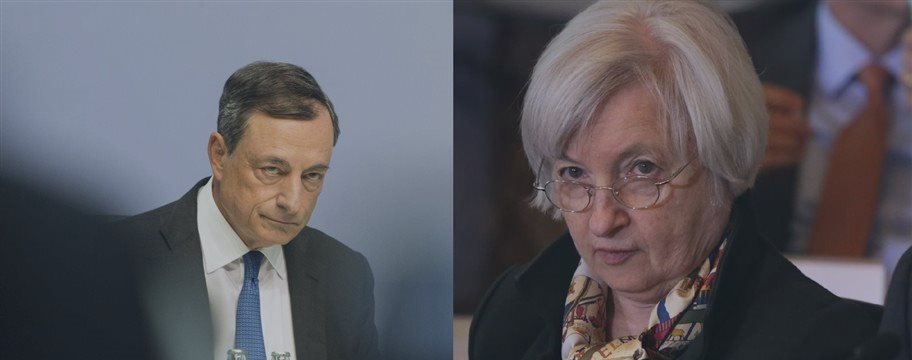
What's ahead for investors amid diverging Fed, ECB policies
The most recent calls from the European Central Bank and its peer U.S. Federal Reserve witness the central banks' monetary policies are diverging.
Taking this into account, Mohamed El-Erian, chief economic adviser to Allianz and chair of President Barack Obama’s Global Development Council, reflects on what investors should expect in the near-term and long-term perspectives.
The short-term consequences are likely to be a stronger dollar, higher stock market volatility and a wider trading range for key interest rate differentials, he writes. It all suggests investors should rethink holding cash as a "waste asset" in their portfolios.
Fed
The Federal Reserve policy makers signaled after their October meeting that a rate increase in December was still on the table. It did so indirectly as it scaled down worries about international economic and financial instability that — previously — had kept the regulator on the sidelines. The bank also expressed it directly by citing the process of “determining whether it will be appropriate to raise the target range [for the federal funds rate] at its next meeting”.
ECB
The Fed's tone stands in utter contrast to what came out of the ECB. ECB president Mario Draghi signaled that the central bank was prepared to expand its large-scale security purchase program to fight economic weakness and deflationary pressures.
The opposing policy signals revive the talk about policy-divergence which recently had been eclipsed by
developments in the emerging market world. During the summer, a disturbing weakening in growth became vivid in emerging markets, as every systemically important economy slowed
(including China) and two of them in recession (Brazil and Russia).
The financial market turmoil that followed increased alarm bells both in the U.S. and Europe in view of concerns about unfavorable spillovers. Thus, the Fed had no choice but to choose a dovish tone at its September meeting.
Implications for investors
Helped by China's monetary stimulus, emerging markets have calmed down, and the Fed now feels cozier about diverging from other global regulators.
- Such divergence promises to drive dollar appreciation, especially against the euro. But the greenback is unlikely to rise too high to accommodate fully the required relative price changes throughout the economy. Thus...
- ...the trading range for the
differential between US and German government yields will rise.
- This, together with concerns about the consequences of less united central bankers, will trigger equity market volatility.
The longer-term consequences are more difficult to predict. El-Erian says that it will be hard to keep this policy divergence for long due to the high level of interconnectedness. Moreover, the U.S. will barely allow the dollar to carry the burden of the adjustment process.
Therefore, either the Fed will be forced to reverse its path as the U.S. economy is pressured by lingering weakness in Europe and the emerging markets; or, a more comprehensive policy response out of Europe revives growth there, allowing the ECB to begin normalizing its policy.
Keeping this in mind, the analyst writes that investors should revisit the conventional wisdom that cash, considered a “waste asset”, does not have a legitimate place in complicated asset allocations. Instead, this is a world in which a good cushion of cash and cash equivalents in portfolios are reasonable for both strategic and tactical reasons.
In the short term, it put investors in a good position to scale into the inevitable price overshoots that are likely to come true, together with excessive contagion within asset classes and unusual correlations between them, El-Erian says. He adds that this is a market in which fundamentally solid stocks and bonds can easily get excessively contaminated by weaknesses elsewhere, in particular given the significant likelihood of uneven liquidity.
In the longer term, a strategic cash buffer provides investors with resilience at a time of genuine indecision. It is still unclear if the global economy will turn to a broader-based growth, thereby validating lifted market prices, or slide into even lower global growth and financial instability as weaker fundamentals dampen central banks’ efficiency in restraining volatility and boosting prices of assets.


